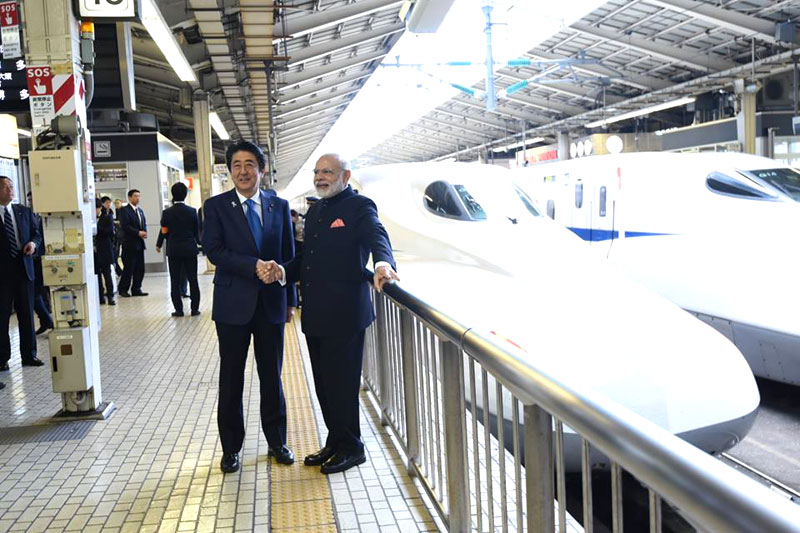Japan has changed its views on BRI and mended its relationship with China for economic reasons
Palak Gupta
China’s Belt and Road Initiative (BRI) project is Japan’s litmus test for balancing its act in the world of geopolitics. Tokyo hopped on board the USD1 trillion New Silk Road project despite being critical about it earlier. The Sino-Japanese relationship started evolving around 2014 after the two countries buried their past hostilities. Interestingly, the ties consolidated and became pronounced around the same time as Beijing was facing the heat of the trade war with Washington. Japan, too, was affected by the aluminium and steel tariffs imposed by the US.

Changing Perceptions
Japan had once vehemently expressed its reservations against the BRI because it saw it as a means of expanding the unilateral clout of China and also as a counter to its national security and interests.
Initially, Japan was apprehensive of the BRI, thinking it will have an adverse impact on the country’s economy. But things seem to have changed after former minister of economy, trade and industry Toshihiro Nikai attended the Belt and Road Forum for International Cooperation in Beijing in May 2017.
In October 2018, Japanese Prime Minister Shinzo Abe visited China, the first by a Japanese PM since 2011. During the visit, Abe signed more than 500 business deals worth more than USD2.6 billion and 30 infrastructure projects with China.
“Japan had clearly stated its stance for supporting the BRI on several occasions and is proactively strengthening cooperation with China in all areas, especially in the third-party markets,” a media report quoted Ryuji Koizumi, a member of Japan’s House of Representatives and director-general of the International Bureau of the ruling Liberal Democratic Party.
“I believe active trade will further deepen ties between the Chinese and the Japanese,” Abe had said during his visit to China in 2018.
Some experts argue that Japan changed its perspective on BRI because it saw the project as an opportunity for its multinationals to expand in other countries.
In addition to this in 2018, People’s Bank of China has also sealed a currency swap agreement with its Japanese counterpart Renminbi Clearing Bank (RCB) aiming to facilitate the economic stability in the two countries.
Hitachi Ltd’s senior vice president and executive officer Kenichi Kokubo in a written interview with People's Daily admitted the use of Hitachi’s products during the construction of China’s ambitious USD1 trillion BRI project, which is also known as the New Silk Road.
“The cooperation between Japan and China is complementary as Japan is good at cutting-edge technology and high-quality services while China is fast in response to the market and good at promoting new business models using various technologies,” noted Koizumi, adding, “So, combined together, Japan-China cooperation will bring more benefits to other places instead of one country dealing with problems all by itself.”
An example of Sino-Japanese collaboration endorsing Koizumi’s remark: Japanese logistics firm Nippon Express joined the Kazakhstan state railway company to move cargo through the Central Asian country which is a significant central station along the BRI.
Furthermore, Japanese trading house Itochu has a freight transport service linking Japan and Europe via China. According to local press the freight service has decided to use the existing local railway logistics between China and Europe.
Sino-Japanese Security and Defence Cooperation
Japan and China share complex security landscape owing to the territorial issues. Japan maintains a significant military presence in East Asia in collaboration with the United States. Both the maritime force and the Japan Coast Guard are responsible for protecting the Senkaku Islands, known as Diaoyu in China, located near Taiwan. It is safe to say that China’s Marine Surveillance Force (MSF) challenges the perimeters that the Japan Coast Guard (JCG) maintains. Japan has voiced its reservations regarding Chinese vessels and airplanes in the sea and airspace surrounding the Senkaku Islands. The islands are currently controlled by Japan but both China and Taiwan claim sovereignty over the islands. The strategic significance of Senkaku increases as oil and gas reserves have been identified under the seabed surrounding the islands.
Additionally, Beijing’s recent military modernisation and expansion in the East China Sea pose a challenge to the Japanese Ryukyu Islands and by extension the US, which maintains a strategic military presence on the largest island of Okinawa. Along with the islands of Taiwan and the Philippines, the Ryukyu Islands represent a geographic chokepoint for China’s naval and civilian activities.
You must be logged in to view this content.

